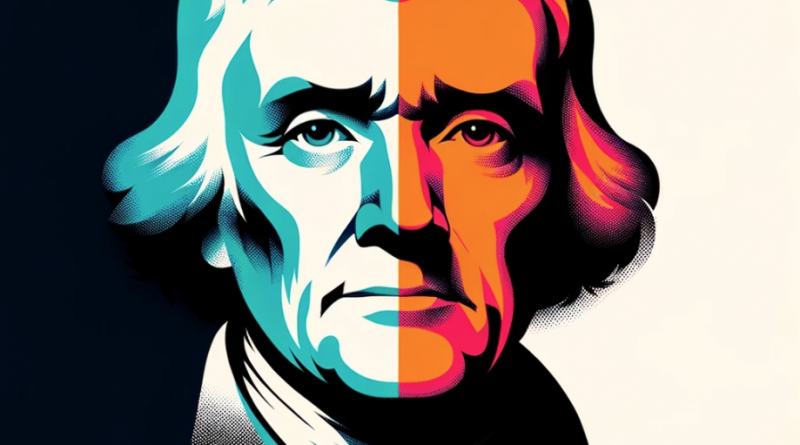The Arcs of Ideals and Reality: The Jeffersonian Dichotomy in American Political Evolution
The American political landscape, rich in historical upheavals, ideological shifts, and transformative figures, presents a fascinating study of contrasts, particularly in the trajectories of the Democratic and Republican parties. Central to this narrative is the dichotomy embodied by Thomas Jefferson: a Founding Father who articulated the noble ideals of liberty and equality but was himself a slave owner, his life a stark embodiment of contradictions.
This essay explores how the Democrats and Republicans, in their unique evolutions, have mirrored aspects of Jefferson’s ideals and his reality. It posits that embracing and living out ideals, particularly those that uphold individual human rights, is paramount to ensuring true freedom for all — a principle echoing through Jefferson’s words, if not entirely his actions.
Democrats: From Jefferson’s Reality to His Ideals
The Antebellum Period and the Civil War
- In the 19th century, the Democratic Party staunchly defended slavery, a bedrock of the Southern economy and social structure. This stance was a clear reflection of Jefferson’s reality — maintaining a system that deprived individuals of their fundamental rights, despite the nation’s founding principle that “all men are created equal.”
- The Democrats’ opposition to abolition and subsequent resistance to Reconstruction policies aimed at granting freed slaves civil rights further entrenched this contradiction.
The New Deal and Civil Rights Movement
- The party’s transformative shift began with Franklin D. Roosevelt’s New Deal, which aligned the Democrats with the working class and minority groups, setting a foundation for broader social justice initiatives.
- The mid-20th century saw the Democrats, under leaders like Presidents Kennedy and Johnson, taking decisive stands for civil rights, culminating in the Civil Rights Act of 1964 and the Voting Rights Act of 1965. This period marked a significant pivot towards Jefferson’s ideals of equality and liberty for all.
Modern Era
- Today, the Democratic Party champions a diverse array of social justice causes, from LGBTQ+ rights to immigrant rights, reflecting a continued commitment to Jefferson’s ideals of equality and individual liberty.
Republicans: From Living Jefferson’s Ideals to Idealizing His Reality
Radical Republicans and Reconstruction
- The Republican Party was founded on anti-slavery principles, and the Radical Republicans after the Civil War aggressively pushed for policies upholding the rights and liberties of African Americans, a clear embodiment of Jefferson’s ideals.
- However, the end of Reconstruction and the Compromise of 1877 marked a retreat from these principles, as economic priorities began to overshadow social justice concerns.
The Gilded Age to the Mid-20th Century
- Throughout the Gilded Age, the Republicans increasingly embraced pro-business policies, aligning with industrialists at the expense of workers’ rights, and distancing themselves from the social equality agenda. This shift towards material and economic gain reflects an idealization of Jefferson’s reality, where economic interests superseded the lived experience of his ideals.
Late 20th Century to Present
- The latter half of the 20th century saw the party realigning with conservative social values while maintaining its pro-business stance. The “Southern Strategy” and the shift in focus to issues like “law and order” further illustrate the move away from the Radical Republicans’ initial ideals.
- In the modern era, particularly during and after the Trump presidency, the party has grappled with internal divisions over its identity, reflecting a struggle between traditional conservativism and a new brand of populism.
Conclusion
The historical journeys of the Democratic and Republican parties, mirroring the dichotomy of Thomas Jefferson’s life, underscore a profound lesson: the pursuit of ideals, especially those that uphold human rights and dignity, is not just noble but essential in striving toward a society that truly embodies liberty and equality for all.
While both parties have, at times, drifted towards the “reality” of economic interests and political expediency, history fondly remembers moments when ideals triumphed. The Radical Republicans’ push for Reconstruction, the Democrats’ embrace of the Civil Rights Movement, and the ongoing struggles for social justice reflect the enduring aspiration to live out the ideals eloquently penned by Jefferson.
As history continues to unfold, American society must reckon with its contradictions and strive not merely to idealize principles of freedom and equality but to actively live them. This commitment is the truest form of homage to Jefferson’s words, ensuring that liberty and the pursuit of happiness are unalienable rights enjoyed by all.

